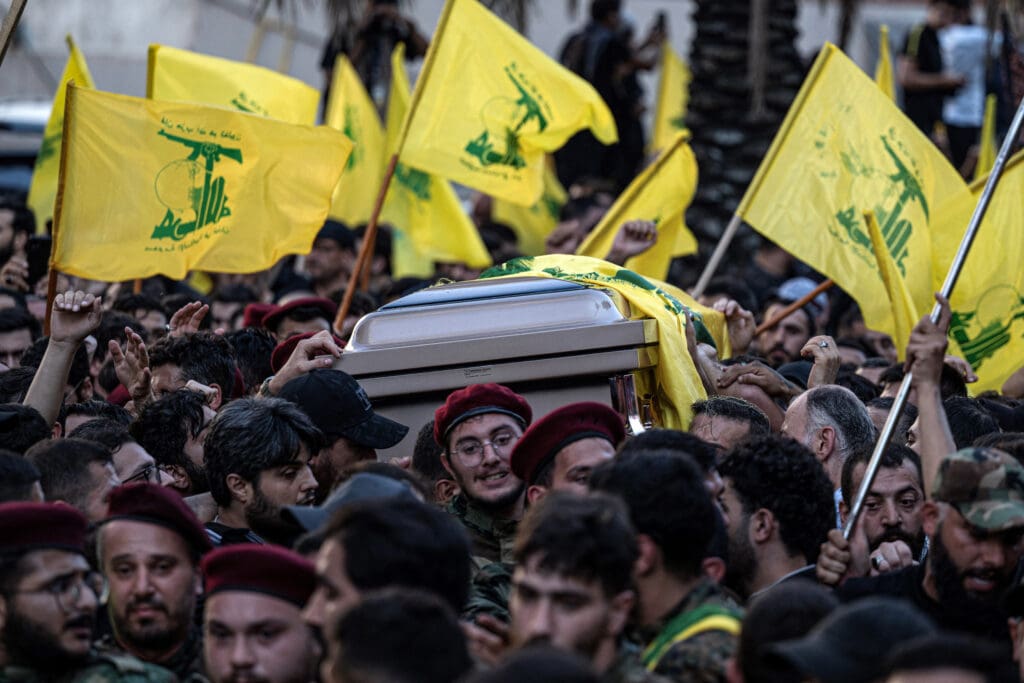Despite renewed international mediation efforts to reach a ceasefire in Gaza, Hezbollah insists that it will respond forcefully to Israel’s assassination of its senior commander, Fuad Shukr, in the movement’s stronghold in southern Beirut. Since Shukr’s killing, and that of Hamas political bureau chief Ismail Haniyeh in Tehran, outside actors have stepped up efforts to mediate a ceasefire in Gaza and avoid an escalation into an all-out regional war. Iran and Hezbollah are facing international pressure to limit their response to one that Israel can absorb without requiring the type of major retaliation that would further inflame the situation.
U.S.-Iranian negotiations, both direct and indirect, have helped restrain Iran from mobilizing its allies on multiple fronts against Israel and sparking a region-wide conflict. The talks have already delayed Tehran’s response, as evidenced in leaks from Iran suggesting that President Masoud Pezeshkian—who favors longer-term operations that would avoid jeopardizing negotiations with Washington—is at odds with the Iranian Revolutionary Guard Corps’ insistence on a robust response.
Russia has also joined efforts to defuse the situation. The secretary of its security council, Sergei Shoigu, visited Iran in early August. Off-the-record sources in Moscow say that Shoigu delivered three main messages: First, Russia stands in solidarity with Tehran and will offer it defensive, but not offensive, support. Second, Iran must not fall into Israeli Prime Minister Benjamin Netanyahu’s trap of igniting a regional war that would directly involve the U.S.—one that could suck in Moscow, as well. His third, key message was that any confrontation must take place outside of Syrian territory, in order to protect Russian interests and military bases there. A flare-up in Syria would damage many countries’ interests, and Moscow would be forced to respond.
Formulating a Comprehensive Ceasefire
Most stakeholders are now convinced that the only way to avoid a regional escalation is through securing a ceasefire in Gaza and a hostage swap deal. That is the thrust of efforts by the U.S., Egypt and Qatar, which have urged the new political leader of Hamas, Yahya Sinwar, to agree to a truce. Although he has appointed leading Hamas figure Khalil al-Hayya to represent the movement in negotiations, Sinwar will ultimately hold the final say.
So far, negotiations have faltered over the duration of a ceasefire: Hamas wants a long-term end to hostilities and the exit of Israel’s military—or most of it— from Gaza, while Netanyahu has said the ceasefire must be temporary so Israel can return to its mission of destroying Hamas. As long as this impasse remains unbridgeable, Israel’s war on Gaza will continue and the risk of a wider war will remain in place.
Avoiding a Regional War
It is therefore reasonable that Hamas, along with other members of the Iranian-led “Axis of Resistance,” have little faith in U.S. efforts. They are convinced that Washington is not serious about pressing Israel to end the war on Gaza. Hezbollah appears to mistrust Washington’s proposals, believing the U.S. position after Haniyeh’s killing stems more from its desire to avoid an escalation between Israel and the axis rather than any enthusiasm for a serious ceasefire in Gaza. Moreover, Netanyahu has sabotaged all previous efforts in that regard—whether in defiance of the U.S. administration or with its approval. Moreover, some officials in Washington want to allow Netanyahu to play for time until the U.S. presidential elections in November.
It is clear that Hezbollah and Iran would prefer an end to the war on Gaza over a full-on confrontation with Israel and the United States. They may even forego a response to the killings of Haniyeh and Shukr if such an end can be achieved quickly. After all, the entire mission of the “support front” is to stop Israel’s destruction of the territory.
Hezbollah is also facing pressure not to respond forcefully in order to avoid the escalation believed to be sought by Netanyahu. Yet the Lebanese movement insists that it cannot accept the new rules of engagement Netanyahu has imposed, under which Israel can strike the Hezbollah stronghold of Dahiya in southern Beirut without paying a price.
Indeed, Hezbollah’s response is likely to be powerful and aimed at bolstering the group’s deterrent power to prevent Israel from hitting Dahiya again. One source close to Hezbollah mentioned that a strong retaliation was inevitable and would happen soon: “We need to respond to restore the balance of deterrence and protect the people in Dahiya.”
“Little choice but to respond”
Three possible scenarios could emerge following Hezbollah’s response. In the first, Israel would face heavy pressure not to respond or escalate further. The rules of engagement in the south of Lebanon would return to what they were before the targeting of Dahiya. Yet such a situation is unlikely. In the second scenario, Hezbollah would land a heavy blow. Israel, unable to accept such a strike without responding, would hit back, provoking a limited escalation including days of back-and-forth strikes. The second scenario would be similar to the confrontations currently underway in southern Lebanon, but with heavier exchanges of fire across a greater area—possibly including Dahiya. This could end in major international interventions to bring about a ceasefire or a return to the previous rules of engagement.
The third scenario would see the situation escalate into a full-scale war, dragging in Iran and other countries, closing vital shipping lanes and possibly involving the United States, directly or indirectly. It would also see Hezbollah striking targets in the center of Israel. This scenario is also unlikely, because many involved parties do not want to see a regional war (with the exception of Netanyahu).
Whatever the case, Hezbollah feels it has little choice but to respond forcefully. It cannot simply accept Shukr’s killing, play down its impact or acquiesce to an Israeli attack on Dahiya. Rather, it is likely to respond in a way that revives the balance of deterrence and fear.
Dahiya is the heart of Hezbollah’s security, military and strategic command system as well as the link between the movement and its social base. The group cannot accept Lebanon becoming “another Syria.” Moreover, a failure to respond would encourage Israel to carry out more operations there. For Hezbollah, Dahiya is a red line.
Realistically then, there is little prospect of these confrontations ending soon. Either the situation will escalate further or a major international settlement will emerge. The latter would change the military reality by imposing a diplomatic solution that establishes long-term stability on the Lebanese border with Israel, the withdrawal of Hezbollah’s heavy weapons and the demarcation of disputed borders.


